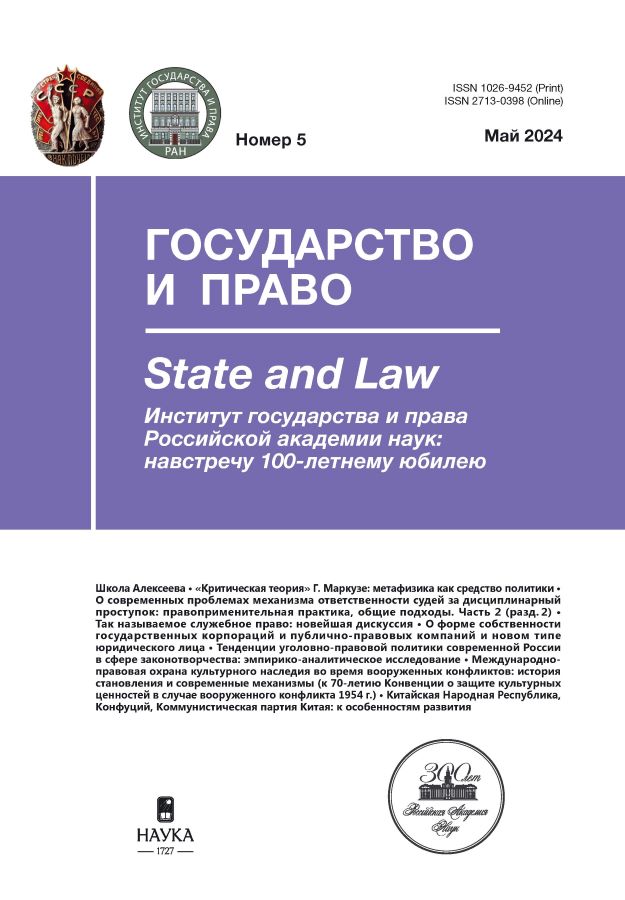Cross-border paperless trade at the present stage: development of favorable for Russia legal conditions and procedures
- 作者: Solovyanenko N.I.1
-
隶属关系:
- Institute of State and Law of the Russian Academy of Sciences
- 期: 编号 5 (2024)
- 页面: 114-123
- 栏目: Law and economics
- URL: https://vestnik.nvsu.ru/1026-9452/article/view/648947
- DOI: https://doi.org/10.31857/S1026945224050122
- ID: 648947
如何引用文章
详细
In the article, the subject of the study is modern legal mechanisms for the formation of favorable legal conditions for trade in international markets carried out in the digital space for Russia. As such, the provisions of the Framework Agreement on the Simplification of Procedures for Cross-Border Paperless Trade in the Asia-Pacific Region (Framework Agreement), which is the newest UN treaty in the field of trade and development, fully dedicated to the digitalization of trade processes and the introduction of paperless technological and legal procedures (Russia joined on July 10, 2023), are considered. The author analyzes the conditions for mutual recognition by states electronic trade documents and data, as well as their exchange; legal problems and proposed solutions for the interoperability of national and sub-regional single window systems and/or other paperless trading systems; principles of electronic interaction in commercial legal relations. The author focuses on the complex legal and technological problem of agreeing on an “essentially equivalent level of reliability” of the cross-border exchange of electronic trade documents, which is the main condition for their mutual recognition by the parties and the main element of the cross-border space of trust. In this regard, various international and national legal approaches are compared to assess the reliability, cross-border recognition, as well as the legal responsibility of subjects of electronic interaction for adverse consequences that may occur as a result of their failure to fulfill obligations related to such interaction. Responsibility is considered as an essential criterion for the reliability of electronic transactions. The author proposes to include the existence of a legal mechanism of responsibility in the field of digital trade interaction (both national and cross-border) among the criteria (indicators) of the “digital maturity” of its participants. Particular attention is paid to Russia’s position on the implementation of the Framework Agreement: coordination of mechanisms to ensure an “equivalent level of reliability” and “independent assessment of readiness” of the national legislation of the Russian Federation. As a result of the analysis of the provisions of the Framework Agreement, it is concluded that it corresponds to the rights, interests and obligations of the Russian Federation in the field of building a cross-border trust space of the Eurasian Economic Union.
全文:
作者简介
Nina Solovyanenko
Institute of State and Law of the Russian Academy of Sciences
编辑信件的主要联系方式.
Email: nina.coshkina@yandex.ru
PhD in Law, Senior Researcher of the Procedural Law Sector
俄罗斯联邦, Moscow参考
- Baranov A. P. Electronic signature and the space of trust // Tax policy and practice. 2012. No. 5 (113). Pp. 66– 69 (in Russ.).
- Kustov V. N., Stankevich T. L. Cross-border trust space as an integral part of the software infrastructure of international e-commerce // International Conference on Soft Computing and Measurements. 2018. Vol. 2. Pp. 259–262 (in Russ.).
- Lovtsov D. A., Terentyeva L. V. Legal regulation of international commercial electronic contracts. Technological and legal aspects of electronic signature // Lex russica (Russian Law). 2000. Vol. 73. No. 7 (164). Pp. 115–126. doi: 10.17803/1729-5920.2020.164.7.115-126 (in Russ.).
- Polyakova T. A., Minbaleev A. V. The concept and legal nature of “digital maturity” // State and Law. 2021. No. 9. Pp. 107–116 (in Russ.).
- Sabanov A. G. Methodology for formulating tasks to improve the regulatory framework for building a space of trust in electronic documents with legal consequences // Information protection. Inside. 2016. No. 5 (71). Pp. 14–19 (in Russ.).
- Solovyanenko N. I. The exercise of the rights of individuals and legal entities in the field of the use of electronic signatures as a condition of trust in the digital environment // State and Law. 2022. No. 11. Pp. 192–196 (in Russ.).
- Ganne E. Blockchain’s Practical and Legal Implications for Global Trade and Global Trade Law. In: M. Burri (ed.). Big Data and Global Trade Law. Cambridge, 2021. Pp. 128– 159. doi: 10.1017/9781108919234.009
- Kustov V. N., Silanteva E. S. Mutual Recognition Mechanism of Legally Significant E-Documents and Data in Cross-Border Document Flow // В сб.: Journal of Physics: Conference Series. 23. Сер. ‘XXIII International Conference on Soft Computing and Measurement, SCM 2020”. 2020. P. 012011.
- Renard R., Ortiz M. R., Kuyler O., Beck S. Digitalizing Trade in Asia Needs Legislative Reform // International journal of blockchain law. Global Blockchain Business Council. Geneva. March 2022. C. 43–47. IJBL–Volume-II.pdf (gbbcouncil.org)
- Weber R. H. Legal Framework for the Single Window Concept in ASEAN: A Successful Movement towards Trade Facilitation in East Asian Countries // Asian Journal of Law and Economics. 2012. Vol. 2. No. 4. Pp. 1–24. doi: 10.1515/2154-4611.1060
补充文件









